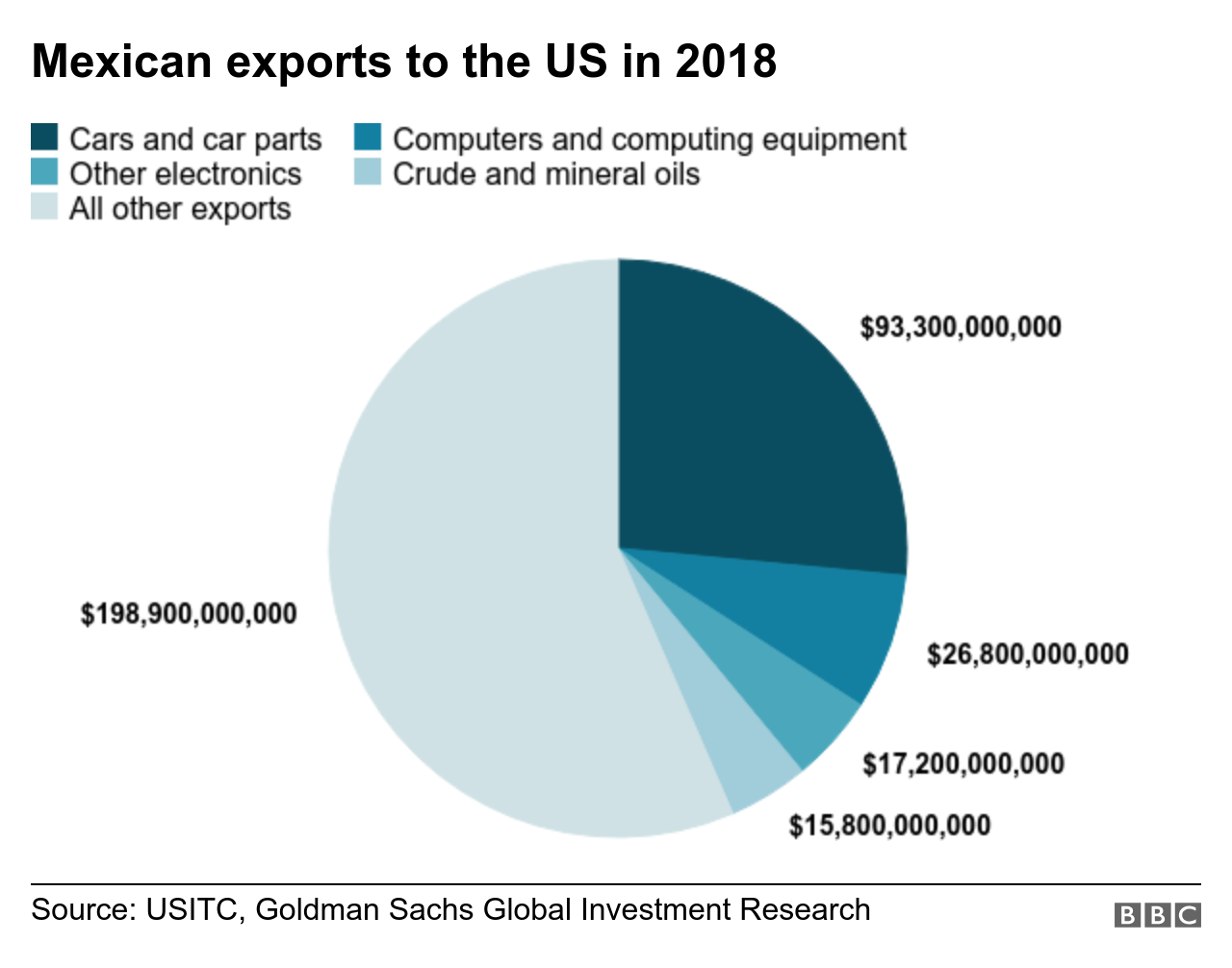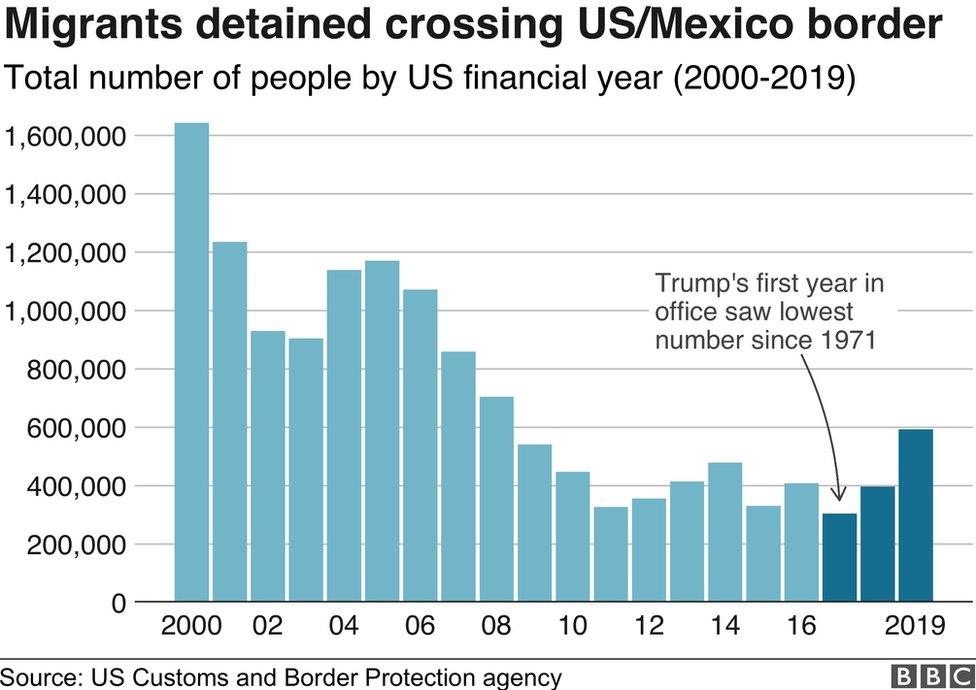US-Mexico talks: Trump says more progress needed to avoid tariffs
- Published
Five numbers that explain US border crisis
US President Donald Trump has said "not nearly enough" progress is being made in negotiations with Mexico to avert his threatened tariffs.
Trump administration officials will meet for a second day of talks with Mexico's foreign minister in Washington on Thursday.
Mr Trump vowed import duties of 5% will take effect on Monday unless Mexico stems the flow of migrants to the US.
Those numbers reached their highest level in more than a decade last month.
What happened in the negotiations?
US Vice-President Mike Pence and Secretary of State Mike Pompeo held talks with Mexican Foreign Minister Marcelo Ebrard at the White House on Wednesday, but the 90-minute meeting ended without agreement.
Mr Ebrard told a news conference afterwards the negotiations had been cordial, but tariffs were not even discussed.
"The dialogue was focused on migration flows and what Mexico is doing or is proposing to the United States, our concern about the Central American situation," he said.
The US president, who is in Europe for World War Two commemorations, warned on Twitter that the tariffs would go ahead next Monday if there is no breakthrough.
Allow X content?
This article contains content provided by X. We ask for your permission before anything is loaded, as they may be using cookies and other technologies. You may want to read X’s cookie policy, external and privacy policy, external before accepting. To view this content choose ‘accept and continue’.
Allow X content?
This article contains content provided by X. We ask for your permission before anything is loaded, as they may be using cookies and other technologies. You may want to read X’s cookie policy, external and privacy policy, external before accepting. To view this content choose ‘accept and continue’.
Under his proposal, duties would rise by 5% every month on goods including cars, beer, tequila, fruit and vegetables, reaching 25% by October.
Mr Trump wants Mexico to stop the hundreds of thousands of mostly Central American migrants who have been seeking entry to the US this year.
The US president announced the planned Mexico tariffs last week on Twitter, catching members of his own party and financial markets unawares.
More than 1,000 migrants cross through a hole in the fence near El Paso, Texas, in the largest single border breach ever recorded
Will the tariffs actually happen?
White House trade adviser Peter Navarro had raised hopes earlier on Wednesday of a possible rapprochement.
He told CNN "we believe that these tariffs may not have to go into effect, precisely because we have the Mexicans' attention".
Mr Navarro said Mr Trump wants Mexico to commit to take all asylum seekers and to divert more resources to its own southern border with Guatemala.
Mexican President Andrés Manuel López Obrador has said he is optimistic about defusing a potential trade war that analysts have said could tip his country's economy into recession.
Some commentators have speculated that Mr Trump will not follow through, pointing out that he reversed course on a threat to close the US-Mexico border in April.
But the US president insisted in a tweet on Tuesday he was not "bluffing". The US is already locked in a tit-for-tat tariff war with China.

Does Trump have political support for Mexico tariffs?
Some members of the president's Republican party in the Senate have threatened a rare revolt.
They have raised the possibility of banding together with Democrats to form a veto-proof majority against his plan.
But other Republican senators and members of the House of Representatives are sticking by Mr Trump on his signature issue.
Trump says it's "likely" that Mexico tariffs will happen
Many lawmakers are worried about the potential impact on cross-border trade and increased costs for US businesses and consumers on imported Mexican goods.
With the clock ticking toward next year's US elections, Democrats have accused Mr Trump of using tariffs and immigration to distract from his political problems.
And the US president has reportedly faced resistance from some of his own advisers, including US Trade Representative Robert Lighthizer, an architect of Mr Trump's China trade policy.
Mr Lighthizer is said to have expressed concern that any duties on Mexico could harm efforts to persuade Congress to approve a new North American trade deal.
What's the situation on the US-Mexico border?
The stakes were raised on Wednesday as US Customs and Border Protection announced that migrant arrests had surged in May to the highest level in more than a decade.
Border Patrol apprehended 132,887 migrants attempting to enter the US from Mexico in May, marking a 33% increase from the month before.
It said 84,542 were families and 11,507 unaccompanied children.
The arrests were the highest monthly total since Mr Trump took office.
Another 11,391 migrants were deemed "inadmissible" and turned away after arriving at US ports of entry, bringing the overall figure to 144,278.
"We are in a full-blown emergency, and I cannot say this stronger, the system is broken," said acting CBP Commissioner John Sanders.

How do the numbers compare with previous years?
Official figures show illegal border crossings have been in decline since 2000.
In 2000, 1.6 million people were apprehended trying to cross the border illegally - that number was just under 400,000 in 2018.
In 2017, Mr Trump's first year in office, the figures were the lowest they had been since 1971.
The decline was in large part due to a dip in the number of people coming from Mexico.
In the past two years, however, the number of arrests has been rising again, especially in recent months.